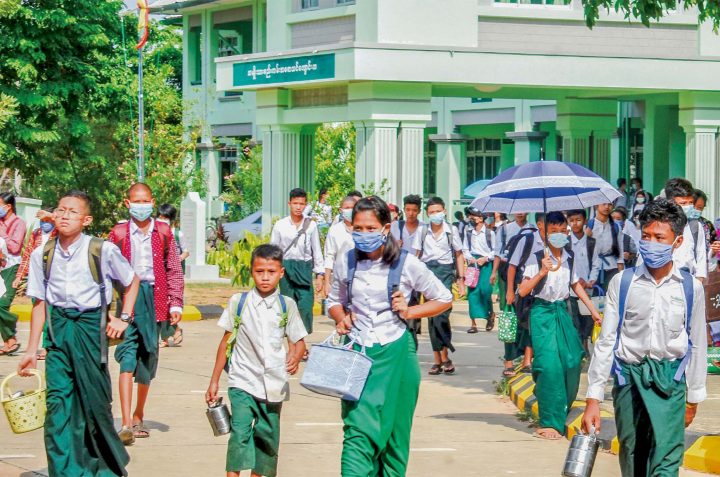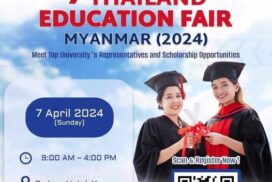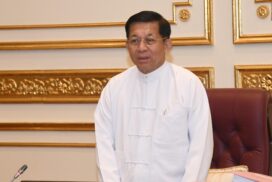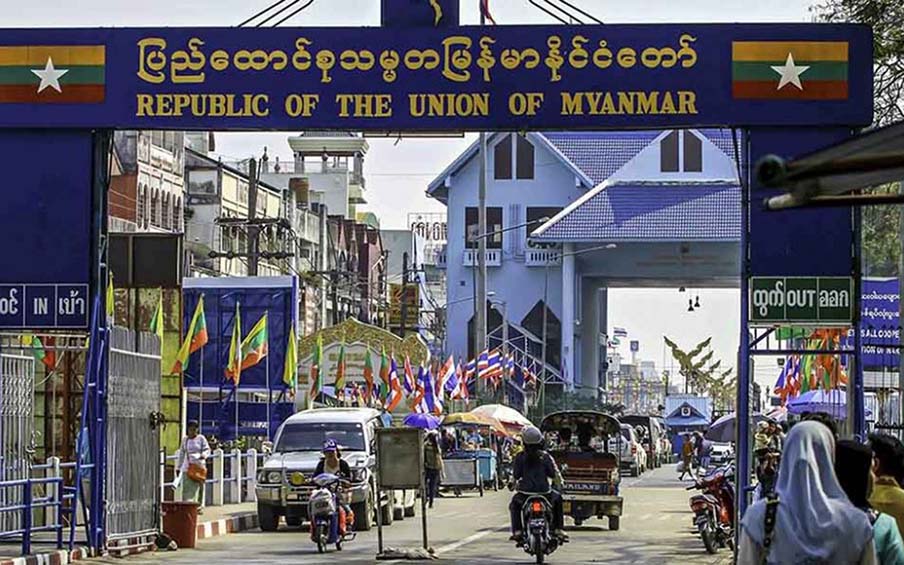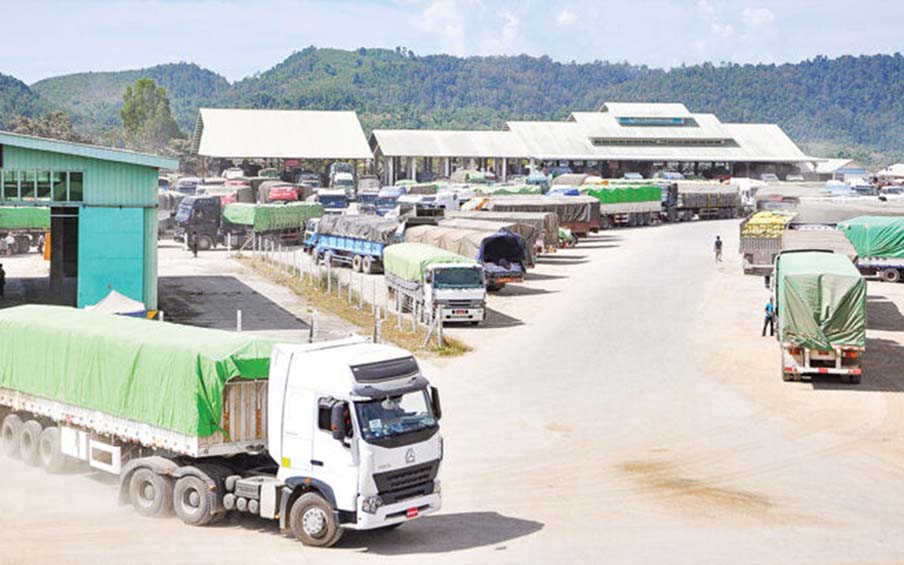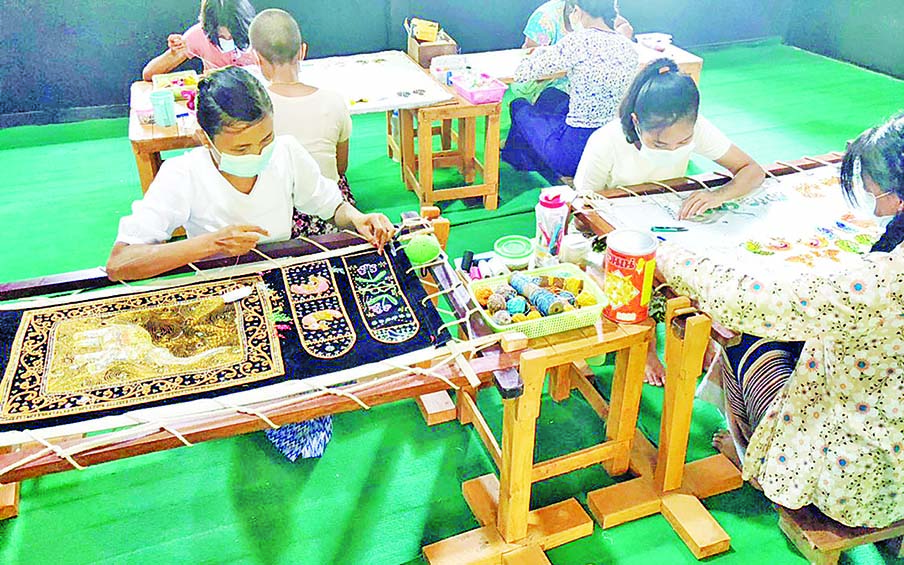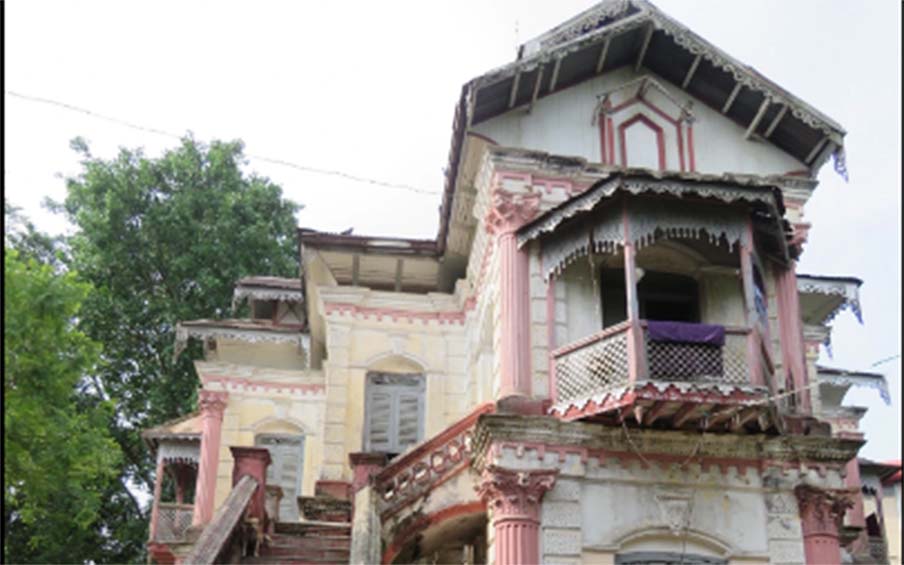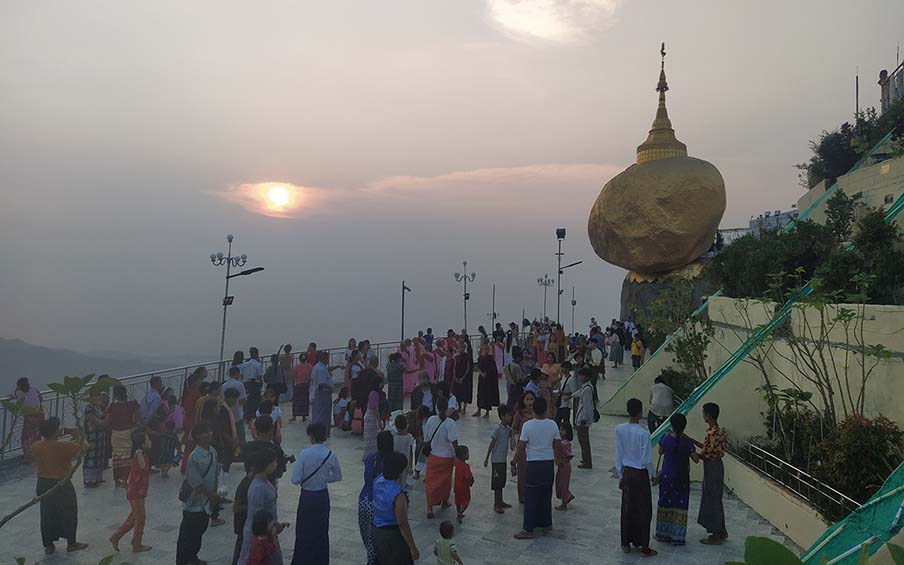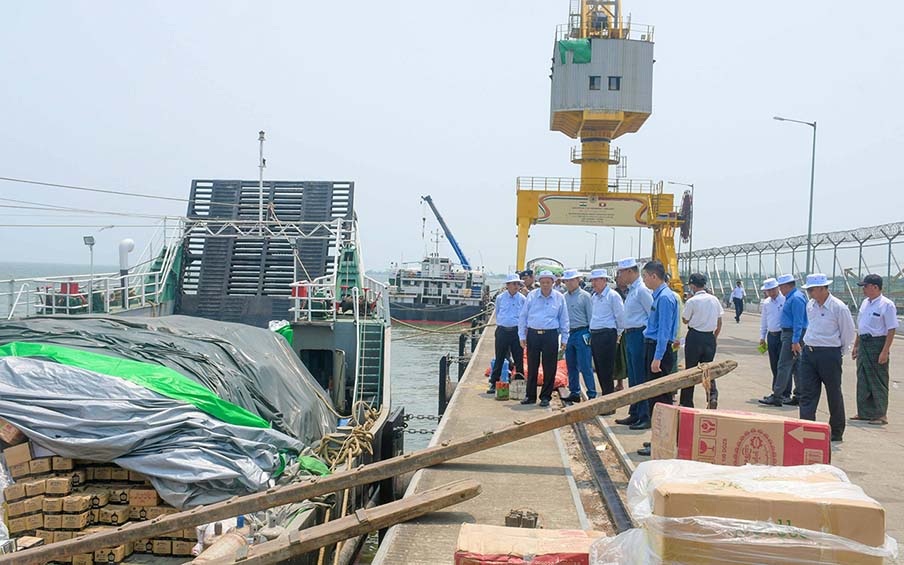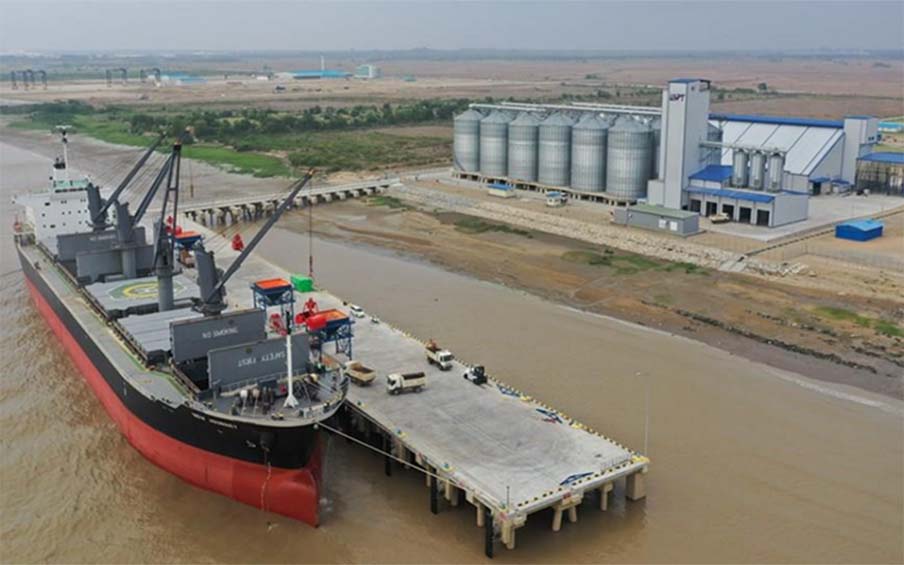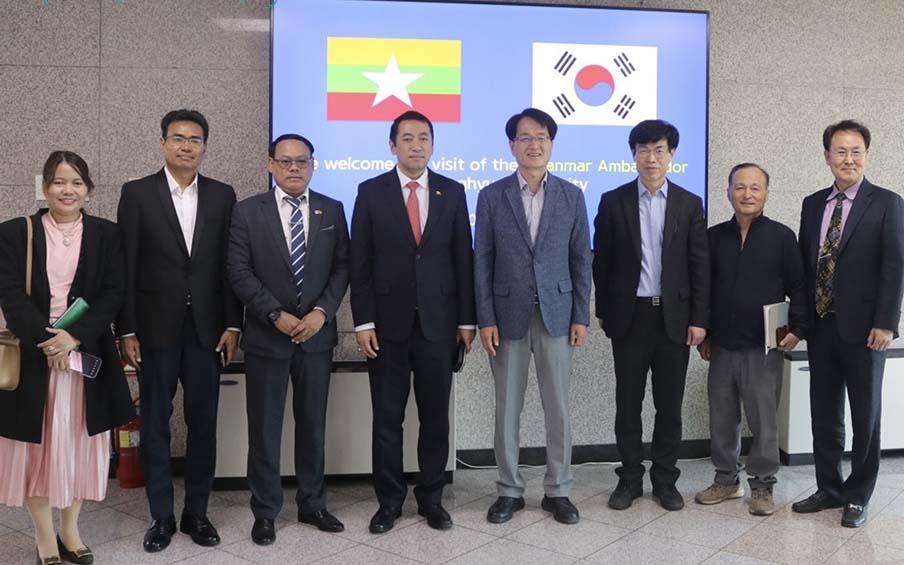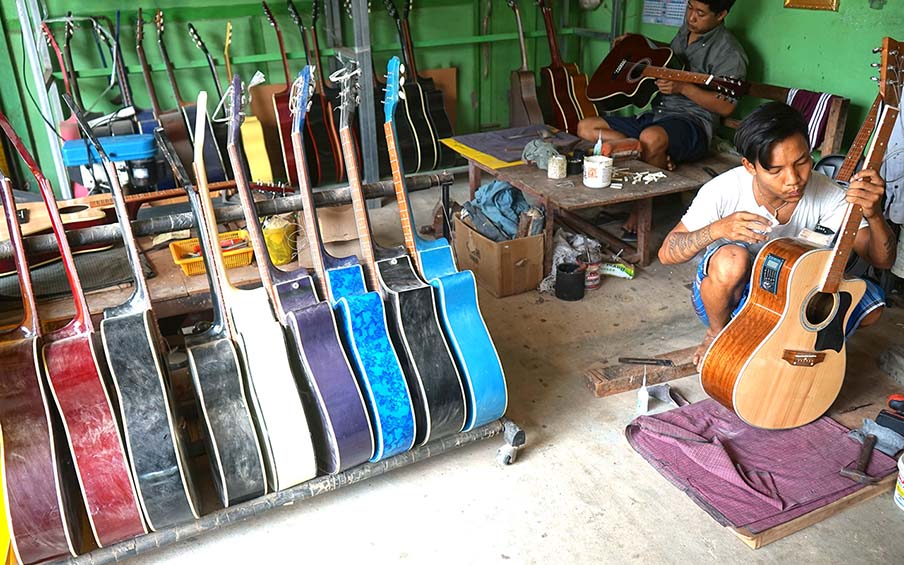By Sann Ni Lar Win
Education means the study of methods and theories of teaching; educator also means a person whose work is teaching others. Schooling means training in schools, and scholar also means a person with excellent knowledge, usually of a particular subject in school.
There are currently 47,365 basic education school in Myanmar, with approximately 9.26 million students in accordance with educational statistics (2018). The majority of these schools are managed by the Department of Basic Education under the Ministry of Education.
In addition, a significant percentage of students access basic education through monastic private, community and ethnic education schools. The current basic education system in Myanmar comprises six years of primary (Grade 1 to Grade 6), three years of lower secondary (Grade 7 to Grade 9) and two years of upper secondary (Grade 10 and Grade 11) education. The official commencement date for schools in Myanmar is 1 June every year.
A school is an educational institution designed to provide learning spaces and learning environments for the teaching of students or pupils under the direction of teachers. Most countries have systems of formal education, which is sometimes compulsory. In these systems, students progress through a series of schools.
Non-government school, also known as private schools, may be required when the government does not supply adequate or specific educational needs; other private schools can also be religious, such as Christian schools, Hindu schools, Arabic schools, Muslim schools, Jewish schools and others.
In home-schooling and distance education, teaching and learning take place independent from the institution of school or in a virtual school outside a traditional school building, respectively. But online education system can give lectures and lessons to the learners and students according to its syllabus without experiments.
Education began in prehistory, as adults trained the young in the knowledge and skills deemed necessary in their society. In pre-literate societies, this was achieved orally and through imitation. Story-telling passed knowledge, values and skills from one eneration to the next. As cultures began to extend their knowledge beyond skills that could be readily learned through imitation, formal education developed.
The famous philosopher who was named “Plato” found the Academy in Athens, the first institution of higher learning in Europe. Likewise, in China, “Confucius” (551-479 BCE) was the country’s most influential ancient philosopher, whose educational outlook continues to influence the societies of China and neighbours like Korea, Japan and Vietnam.
Education, since the early days, has been highly regarded in Myanmar. “Nicola Manucci”, a Venetian who travelled in Myanmar about 1700 AD described the country as “a kingdom governed by the pen, for not a single person can go from one village to another without a paper or writing”, like Manucci, many travellers from the West were impressed with what was practically universal education for boys long before anything of the kind existed in the European world.
Life revolved around the values of “extended families” that were strong. The village, then, was a self-contained agricultural unit of community life, the monastery served as the centre of culture and education where all children could learn the 3R’s. Education was largely religious and ethical rather than economic life, and education was very closely related in those days as it had been in mediaeval Europe. That education, or rather a formal schooling, was preparation for life was introduced into Myanmar with the coming of the British. Ironically, in this era of diminishing personal and family values and increasing awareness of the environment and the world we live in, many educators in the West are returning slowly to the idea that education is life itself and not merely a preparation for life and that life is education.
In present-day Myanmar, monastic education, which had been the mainstay of education in the country still exists side by side with the formal school system. In the civilization of mankind, spiritual culture and physical culture play an important role. In competing with internationals, to regarded as civilized and good-natured people, we have to obey the teachings of our parents, our first and foremost mentor, since the day we were born.
Now, politically extreme terrorist groups, who wish to destroy national interests, instigate teachers and education staff to CDM (Civil Disobedience Movements) and threaten, with death, those who do not do so Innocent young students are forced to drop out of school. From 1 to 26 May, a total of 18 arson attacks, 115 times of bombings and attempted bombings occurred at basic education schools and universities across the country. Moreover, they commit vulgar acts that are unacceptable to any civilized society, such as sticking texts against the school attending and drawing threat messages using spray paint.
When the international community is not accepting or condemning such acts of vandalism, they are becoming more and more like extremist terrorist organizations in order to destroy the educational aspirations of future youths. The majority of the parents and the public are protesting against such activities and the organization behind them.
The primary need for the development of the country and the improvement of social life to improve the education sector. Every country in the world focuses on education to develop a new generation of talented young people in building a future nation.
The State Administration Council is overseeing the reopening of schools nationwide from 1 June following the COVID-19 prevention, control and treatment regulations during the period of adequate control of the COVID-19 disease to prevent further loss of education. Enrolment of students is being accelerated at present.
Preparations are underway in order to ensure students can study safely, distribute free textbooks, teaching aids and masks, face shields to protect COVID-19, and install handwashing facilities at schools.
The people need to get wider knowledge with skills. An education motto mentioned, “The national discipline starts from the school”, which forges the conscious and nationalistic spirit. The Constitution stipulates that every citizen shall compulsorily learn basic education according to Section 366 (a) and (b) of the Constitution of the Republic of the Union of Myanmar (2008).
“Education is in crisis”. This conclusion was reached by World Bank researchers as they write the 2018 World Development Report. Today, most children get to go to comprehensive school. However, merely going to schools does not guarantee to learn, the researchers write in the report.
Schools should teach skills that help young people secure a job and lead meaningful lives. Education is key in preventing social exclusion and lifting people from poverty.
However, the biggest obstacle to learning by far is still not going to school at all. In 2016, more than 61 million children of comprehensive school age and as many as 202 million children of secondary school age did not go to school.
According to the report, among the first to be left outside school are those already in a vulnerable societal position because of gender, disability, caste, or belonging to a certain ethnic group. Poverty is still one of the biggest obstacles to a child going to school.
In countries of low-income level, primary and secondary education completed by just one in three children. Over 60 per cent of comprehensive school pupils in developing countries do not even learn basic skills in school. If skills learned in comprehensive school are weak, many are left lacking skills need in work, such as basic skills in mathematic or reading and writing.
In Myanmar, 12 per cent of the children between age 5 to 9 are out of school, and 11.7 per cent of the children age 10 to 13 are out of school as a result of their parent’s poverty, according to the report of UNICEF (2018).
Everybody benefits from investments made in education and in the quality of education. Education is important for societal development and for diminishing in equality. There is the best investment for education or human resources development of our country. In the developing countries, well-wishers used to donate the school-buildings and furniture, books and stationery, computers and accessory, money and scholarship for the necessity of the Basic Education schools.
For example, I studied in details concerning “The Education Foundation” which was named “Teacher Daw Khin Hla Hla’s Education Foundation in Padaung Township, Bago Division (West), set up by Colonel Tin Hlaing (Minister for Home Affairs, Retd) whose Daw Khin Hla Hla’s husband. This foundation was formed as a “Teacher’s Resources Centre” for their teaching skills. If the quality of education is seen as poor, parents may not be ready to send their children to schools. So, this foundation often donates money for poor students and teachers. As the progressive results of examination yearly, the outstanding students and teachers are honoured by patron U Tin Hlaing.
I pray that the well-wishers should donate and participate generously in the educational development of our mother country of Myanmar. During the reopening of schools, the people should condemn such brutal violence against innocent people and cooperate with the security members in a safe community. The terrorists who threaten the lives, property and social security of the people who want to live in peace will be taken actions under the law.
References,
(1) အနှောင်းသေချာဖို့ အစကောင်း ရန်လိုပါသည်။ (စန်းနီလာ၀င်း-မြန်မာ့ အလင်း ၂၂-၅-၂၀၂၁၊ ၂၃-၅-၂၀၂၁)
(2) Education in Crisis: World Development Reports (World Bank, 2018)

